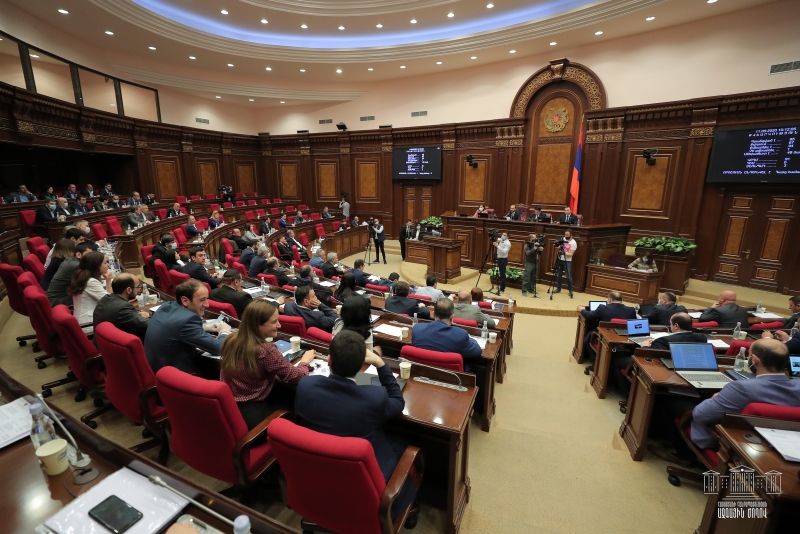
Armenia has continued to steadily claim its place in the democratic international arena since the Velvet Revolution of 2018. However, this is not without ongoing internal struggles that often revolve around culture, mentality, national identity—and most intimately, familial norms.
As Armenia adapts to European legal standards and requirements, considerations regarding national values come to the forefront. Many of these considerations and issues have to do with family.
Last week, Armenia’s National Assembly ratified the Council of Europe (CoE) Convention on the Protection of Children against Sexual Exploitation and Sexual Abuse. In a 79-12 vote, Armenia finally joined the 45-member Council of Europe states that have already ratified and implemented it.
The convention—also known as the Lanzarote Convention—is the most contemporary and comprehensive international legal document that criminalizes sexual abuse against children. Nations that ratify it are expected to establish victim-support programs, provide information to children on the dangers of sexual exploitation in schools and encourage the public to report suspected child abuse. Most significantly, the Lanzarote Convention is the first international treaty that addresses child sexual abuse that takes place within the family.
The ratification, which had been long-overdue since the Convention was first signed in 2010, was met with resistance from opposition parties and conservative groups. The Prosperous Armenia Party, backed by the Armenian Apostolic church, voiced the strongest criticism, which was to be expected given the current makeup of the National Assembly.
Far more interesting and noteworthy are the online public discussions that have followed the vote. Armenians are now openly offering a close and uncontrived look into their personal sentiments and concerns around something so intimate. There is an obvious ongoing shift in the public sphere.
Family is widely considered the cornerstone of Armenian culture. It is the foundation of her national values. There has always been a strong stigma against criticizing the Armenian family. Topics of domestic violence and abuse have long been avoided in public discourse due to fear that these conversations—and awareness around these matters—will threaten the traditional values of the country. This is now changing.
In the last two years, conversations about sex, sexual education and sexual abuse have been slowly becoming more normalized in the public realm (particularly on social media). In 2019, journalist Lucy Kocharyan received and published approximately 200 letters from victims of sexual abuse and domestic violence. Many of these stories were childhood stories. This was an eye-opening moment that exemplified Armenia’s refusal to continue the tradition of silence and taboos.
As a result, today the Lanzarote Convention is being discussed openly by parents, teachers, lawyers, activists and psychologists who have been voicing their opinions online about the importance of the convention and their reservations. In other words, what we have is an ongoing public discussion about what to expect from the ratification and how to navigate it in an Armenian way.
This is not an exclusively Armenian dilemma. EU conventions that cover such sensitive social topics are often met with a level of skepticism in Eastern European states. Eastern Europe is where tradition and unwritten moral codes prevail, so the public is apt to respond with caution and deliberation. The public discourse can indicate the best paths for implementation.
In Armenia, this dialogue is an achievement in and of itself. It needs to be followed closely to inform and shape the implementation of the Lanzarote Convention. While there is little doubt that the Convention is a remarkable blueprint, the actual application of the Convention’s requirements should be tailored to Armenia’s cultural characteristics and realities. This will help ensure that Armenia stays true to the spirit of the 2018 Velvet Revolution. A liberated and informed public that is free to voice its opinions—and progress on its own terms—is the hallmark of a true democracy.



Very informative. The methods of implementation will determine whether Armenia’s reforms are sustainable. I believe Armenians will find their own path.
As a father of 6 and grandfather of 2, Its important for parents to teach their children the facts of life and even some unpleasant ones. The role of schools is to educate and to inform parents or indeed Social workers if a child is suddenly more withdrawn and morose. It is not right for schools to take on the role of sex educator outside the realm of biology lessons at minimum 12 years of age. Some of these UN inspired proposals impact upon our traditions and family life and so should be carefully explained to the public at large and only adopted following referendum.
How does this law impact upon traditions and family life particularly in relation to Armenians living in Armenia?
Are you saying domestic violence or child abuse is an Armenian tradition?
Regarding sex education in school.If the parent is responsible to educate the child in this matter how is the child to know what is right if the abuser is the parent?
Dear Sevag, the convention will impact Armenians living in Armenia in the most direct way. Once it is implemented, Armenia will have new criminal laws against sexual abuse of children, a helpline for victims, a school program that will address the dangers of sexual abuse, etc … People will have to discuss the matter with their children and among themselves – a process that has already begun.
I am not implying that domestic violence or child abuse is an Armenian tradition. These problems exist in Armenia as much as they exist anywhere else. However not discussing domestic violence or child abuse that happens within the family is an approach that is deeply rooted in our culture. Victims are often shamed and condemned for voicing their stories and the police are inactive. Not having the necessary laws in place for these specific crimes makes everything only much harder.
As for sex education, it has been part of the school curriculum in Armenia for the last 10 years. Due to the convention, the topic of sexual abuse and exploitation will soon become part of it. You are correct, we can not expect the parent to inform the child about the danger of the abuse if he/she is the abuser. That is why ratifying this convention was an important step and I hope Armenia will implement it in the most culturally sensitive way.
Dear Nuard I completely agree with what you have written and as with any country it must be implemented with consideration of the local culture. What annoys me is that Armenians ( well almost all) consider themselves as modern Europeans yet run away from implementing any of the conventions. They want the benefits of the European Union but without having to follow the rules.
The UK Brexit thing is a good example.